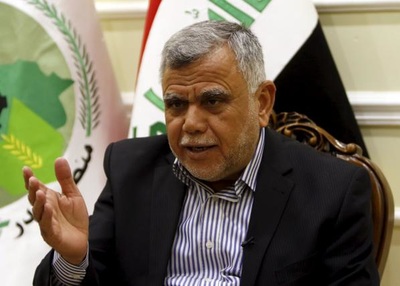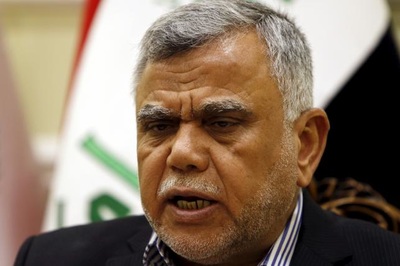Hadi al-Amiri also said Islamic State leader Abu Bakr al-Baghdadi was alive and in Iraq, despite reports that he had been wounded.
"Many of its leadership have been killed but one should know that Daesh (IS) is still strong," said Amiri, leader of the Badr Organization whose armed wing has been fighting alongside Iraqi security forces to recapture territory seized by IS.
"Their attacks are still daring and swift and their morale is high. They still have money and weapons." Amiri delivered a damning assessment of the air strikes that the United States and its allies have been conducting against Islamic State for almost 18 months.
"Today Daesh is a state, it has command centers, their locations are known, their logistics are known," Amiri said. "Its leadership is known, its military convoys are known, its training camps are known. Until now we have not seen effective air strikes."
He said the ultra-hardline insurgents had secured sophisticated U.S.-made anti-tank weapons including TOW missiles through Gulf Arab states. And he ridiculed the idea that Western powers could ensure arms only reached moderate rebel groups.
"They (rebels) did not capture these missiles, they were supplied by America, Saudi Arabia and Gulf states under the pretext of arming the moderate opposition in Syria. Who is the moderate opposition? Ahrar al-Sham? Jaish al-Islam? Nusra or Daesh?" he asked, reeling off the names of competing Islamist factions.
"All of them are terrorists," he said. "Any moderate factions in Syria are weak. Even if they are supplied with weapons, Daesh seizes them."
Military aid from states including Saudi Arabia has been supplied to Syrian rebels fighting under the banner of the Free Syrian Army in western Syria, and some of these groups have received military training from the U.S. Central Intelligence Agency. The training has included how to use TOW missiles, supplied via Turkey and Jordan.
GOVERNMENT FIGHTBACK
Shi'ite paramilitaries like Amiri's have played a vital role in helping Iraqi security forces recover lost territory from IS, which seized a string of major cities in 2014. When the militants declared that year that they had established an Islamic caliphate across parts of Iraq and Syria, he left a senior government post and rushed to the frontlines.
Since then, the government forces and their paramilitary allies have regained control of key cities -- Tikrit, Ramadi and Baiji -- with the support of the U.S.-led air strikes.
But he said there were more obstacles ahead before they could launch a battle to recapture Mosul, the country's second city and the biggest under Islamic State control. Prime Minister Haider al-Abadi and his predecessor have long pledged to "liberate" Mosul but their plans have been repeatedly delayed.
"There are preparatory operations to retake Mosul but other operations have a priority. We want to go to Mosul with the reassurance that Baghdad is safe and all the provinces in the north and the south are safe. This is the main reason that delayed us advancing toward Mosul," Amiri said.
"We have a decision not to enter the city of Mosul. We will surround it from outside and leave its people and its tribes to take part while we conduct the siege."
SECTARIAN SPLIT
Amiri said Sunni-Shi'ite tensions galvanized by the war in Iraq and neighboring Syria were swelling the ranks of Islamic State.
The bombing of a Shi'ite shrine housing the tombs of two imams in the Iraqi city of Samarra in 2006 was the trigger for the worst sectarian carnage to engulf Iraq in the past decade, and now the Syria conflict has splintered the Middle East along the faultline dividing the two main denominations of Islam.
Syria has become a battlefield in a proxy war between President Bashar al-Assad's main ally, Shi'ite Iran, backed by Russia, and his Sunni enemies in Turkey and Gulf Arab states, supported by the West.
"There is no terrorist organization with the ability to recruit and organize youths like Daesh does. We should know our enemy accurately and precisely to be able to defeat them," Amiri said.
"Daesh has no problem recruiting. Foreign fighters are still flocking in huge numbers to Iraq and Syria via Turkey," he added. He accused Saudi Arabia of being the breeding ground of the ultra-hardline Wahhabi ideology embraced by IS and other al Qaeda-affiliated groups.
"Where does this fundamentalist, extremist Islamist ideology, come from? Where was it nurtured? Its origin is Saudi Arabia," he said, adding "we need to combat this (Daesh) ideology before we dry out its funding."
Amiri's Badr fighters fought on Iran's side in the 1980-88 war against Iraq's Sunni dictator, Saddam Hussein. The militia came to dominate much of southern Iraq after the U.S.-led invasion in 2003 that toppled Saddam, and during the sectarian fighting that followed.
"I fought Saddam Hussein for more than 20 years. If I knew the alternative to Saddam was al Qaeda, Nusra or Daesh, I would have fought with Saddam against them," he said.
"Saddam executed more than 16 family members ... but there is nothing worse than these extremist groups. They are a real danger to the whole world."
Source http://www.reuters.com/article/us-mideast-crisis-iraq-amiri-idUSKCN0V41Z7



 RSS Feed
RSS Feed